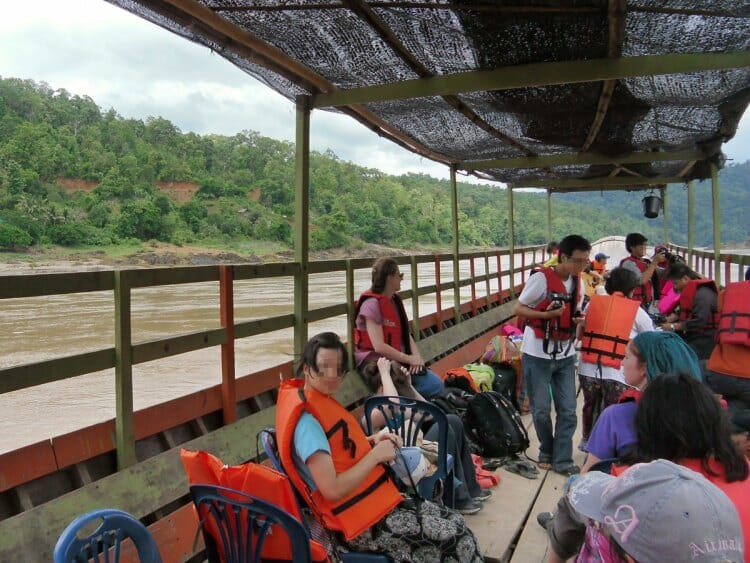Last week, the students and staff of the EarthRights School Mekong visited Sop Moei village, an ethnic Karen community tucked away deep in the mountains of Mae Hong Son Province at the confluence of the Moei and Salween rivers on the Thai-Burma border. It took us several hours and three different modes of transportation (van, four wheel drive pick-up truck, and boat) to get there. The trip was worth it, despite rain, precarious roads, and mild carsickness: the village is in a gorgeous location and the community welcomed us with open arms.
The Salween is the longest undammed river in Asia, but it is currently being threatened by a proposed series of large dams in China and Burma. The first, the Hatgyi Dam, will be built just 30 kilometers upstream of Sop Moei and would put the village underwater, so our students had a lot to learn about river-based livelihoods and anti-dam advocacy from this community.
This trip was the first chance I’ve had to watch this group of students learn outside of the classroom, and they flourished. Whether sitting in the local church speaking with community leaders about their activities on the annual International Day of Rivers, hiking through the community forest with the local plant expert in the pouring monsoon rains, or talking late at night with our host sister, all the students seemed to have endless questions and ideas. I could sense they all felt inspired by the strength of the Sop Moei community members, who use their own local knowledge of the River and the forest to defend their livelihoods against proposed dams. Many of our students from the more politically repressive Mekong countries had never seen such a well-organized, united, and strong community, and they told me they were excited to apply these new techniques in their own countries. That’s why these field experiences are so invaluable to our students: we can share many tools with them in the classroom, but seeing a well-organized community in action is the best way to learn new strategies and get inspired as a young grassroots leader.
We all felt a little sad to leave Sop Moei. After three days of living in their homes and learning about their lives, we felt a sense of solidarity with the community and wanted to help them in their fight against dams on the Salween. The village leader, who spoke passionately against the projects all week, told us never to forget about Sop Moei and the challenges the community faces, and I don’t think I or any of the students ever will.
The students also wrote reflections of the experience. One Thai student said, “The Sop Moei villagers taught me about their vision and practices, and I felt good that I could speak directly to them […] I will remember this good experience from the villagers and apply it to my life even though it’s different from my own social and environment. I think I can apply it, especially their adoration of nature. Now I really realize this point, because the nature gives us many things , so we should give good things back to the nature. I hope I will come back to this village again.”
Another from Vietnam said, “Culture and traditions are maintained very well. […] The role of women seems to be equal with men. I could not see that sort of thing in any village in Vietnam that I visited. The enthusiasm of local people and their knowledge was exquisite. I knew that before visiting but it was still amazing. I learned that it is very important to involve the participation of local people in decision–making process [for large development projects].

A Lao student related the trip back to his work, saying, “I hope this study it will be useful to my work when I go back Laos. I may use Sop Moei villagers’ experience with my community, especially the and dam protest techniques. In my country it is not easy to access information. Communities along the Mekong River are very united, but they are not strong like in Sop Moei village. This experience will be stronger if they have information. It will be not useful only for the communities, but also for local NGOs . The Thai Ban research is very useful because in my country this does not exist. So I think it will be good example for my communities. This experience makes me more motivated to work and I think that it will help me a lot in my future work.”






